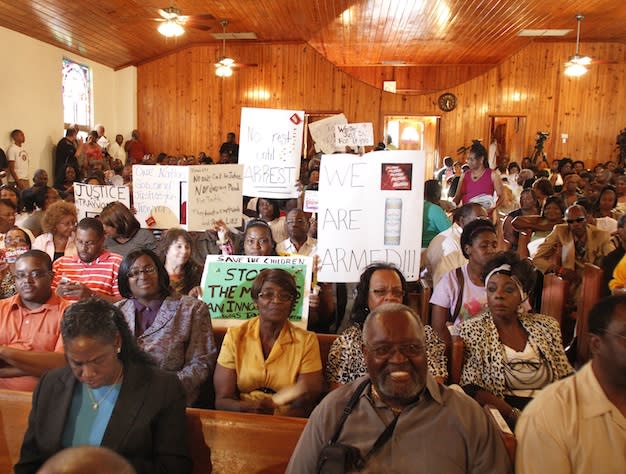 The Lookout
The LookoutTrayvon Martin case: Why ‘stand your ground’ defense may not help Zimmerman

The U.S. Justice Department is investigating the fatal shooting last month of Trayvon Martin, an unarmed Florida teen. But despite widespread public outrage over the incident, there's reason to think the feds could have a hard time bringing civil rights charges. A separate state homicide probe, though, might be more likely to bear fruit.
Bringing federal civil rights charges "is not an easy case," Stephen Saltzburg, a professor at George Washington University Law School, told Yahoo News.
George Zimmerman was patrolling the streets of a gated community in Sanford, Fla., on Feb. 26 when he spotted Martin, 17, and told a police dispatcher that a "black male" was acting "suspicious." Zimmerman, 28, ignored a warning from the dispatcher not to pursue Martin, and a violent confrontation ensued, leaving Martin dead. Zimmerman, a white Hispanic, told local police he acted in self-defense, and he has not been detained or charged, though questions have been raised about the thoroughness of the police investigation.
In its statement announcing the probe, the Justice Department appeared eager to lower expectations, noting that prosecutors "must prove beyond a reasonable doubt that a person acted intentionally and with the specific intent to do something which law forbids—the highest level of intent in criminal law." And just hours earlier, the White House had called the case "a local law enforcement matter."
It's easy to see why the feds might be wary. To successfully bring civil rights charges against Zimmerman, prosecutors would need to establish beyond reasonable doubt that he targeted Martin because of his race; that in walking on the streets, Martin was using a public space and therefore was engaged in a federally protected activity; and—crucially—that Zimmerman's goal was to prevent Martin from using those streets.
The racial angle would likely be easiest to prove, Saltzburg said. Zimmerman told the dispatcher that Martin was black, and later in the call appears to have used a racial slur. Zimmerman's father has said he's not a racist.
As Yahoo News reported Tuesday, under "streets theory," some courts have held that walking down the street is a federally protected activity, akin to voting or riding on public transport. But Saltzburg said that's far from a slam dunk. "In a gated community, that's a little bit of a stretch," Saltzburg said. "I'm not saying it's impossible, but it's difficult."
Likely hardest of all, Saltzburg said, would be proving that Zimmerman aimed to stop Martin from using that public space. "It looks to me like he was over-reacting to something that wasn't suspicious, and was not trying to stop him from using a public sidewalk," Saltzburg said. "If you have to show he was stopping him from using a public space, that's a pretty hard thing to show."
The Justice Department noted in its statement that in addition to conducting its own investigation, it would offer help to state authorities, who said Tuesday they've opened their own grand jury probe, which could lead to ordinary homicide charges being brought against Zimmerman.
That may be more likely. In recent days, there's been widespread talk that Florida's "stand your ground" law could stymie prosecutors. The law, passed in 2006 after intense lobbying by the NRA, allows people bearing arms to use deadly force in response to a perceived threat, rather than having a duty to retreat.
But for all the attention it's received, "stand your ground" might not be enough to save Zimmerman. The law as written applies to someone "who is attacked in any other place where he or she has a right to be." The evidence—including Zimmerman's 911 call and public comment by Martin's girlfriend, who was on the phone with him at the time of the incident—strongly suggests that Zimmerman wasn't attacked, but rather was himself the attacker.
"If Zimmerman was the aggressor, then he cannot rely on self-defense or 'stand your ground,'" David A. Brener, a Florida criminal defense lawyer who has defended several successful cases using the "stand your ground" law, told Yahoo News.
Still, couldn't Zimmerman claim he perceived a threat, even if that perception turned out to be wrong?
"Florida recognizes that the danger need not be actual," said Brener. "But it must be reasonable for the person to believe that deadly force was necessary, and it must be imminent. So it's not enough to say I had an honest belief that he was going to use deadly force on me. That belief has to be reasonable."
It's that issue of the reasonableness of Zimmerman's belief that he faced a deadly threat that could offer prosecutors a path to bringing charges. Martin, of course, was carrying only a bag of Skittles and an iced tea.
More popular Yahoo! News stories:
• Trayvon Martin's parents: Phone call proves slain son did nothing wrong
• Suspected Army shooter's defense may argue Army didn't see warning signs
• Federal probe could hang on whether Trayvon Martin was targeted by race
